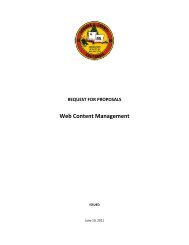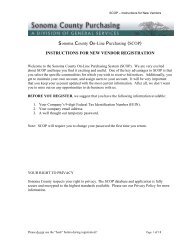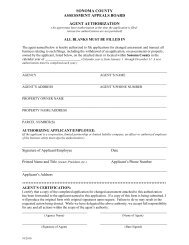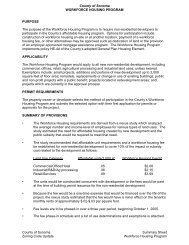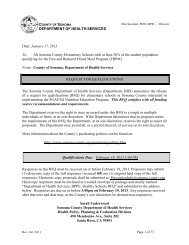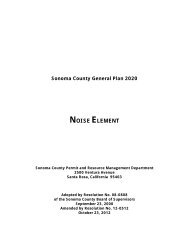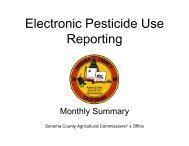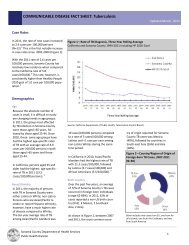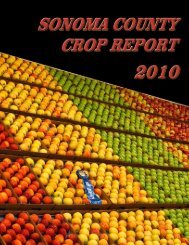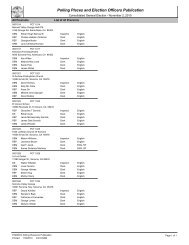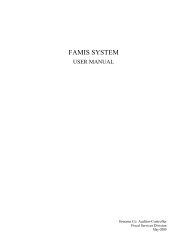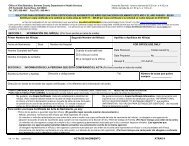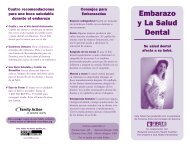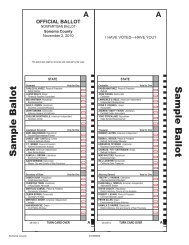Application Packet: Class B Cottage Food Operation - Sonoma County
Application Packet: Class B Cottage Food Operation - Sonoma County
Application Packet: Class B Cottage Food Operation - Sonoma County
Create successful ePaper yourself
Turn your PDF publications into a flip-book with our unique Google optimized e-Paper software.
7. What is meant by “direct sale” of cottage food?<br />
“Direct sale” means a transaction between a CFO operator and a consumer, where the consumer<br />
purchases the cottage food product directly from the CFO. Direct sales include, but are not limited<br />
to, transactions at holiday bazaars or other temporary events, such as bake sales or food swaps,<br />
transactions at farm stands, certified farmers markets, or through community-supported agriculture<br />
subscriptions, and transactions occurring in person in the CFO. NOTE: A CFO operator may sell<br />
cottage food products at a permitted community event provided the CFO operator has a valid<br />
temporary food facility permit. <strong>Cottage</strong> food products offered by a registered or permitted CFO are<br />
classified as being from an approved source.<br />
8. What is meant by “indirect sale” of cottage food?<br />
“Indirect sale” means an interaction between a CFO, a third-party retailer, and a consumer, where<br />
the consumer purchases cottage food products made by the CFO from a third-party retailer that<br />
holds a valid retail food facility permit issued by the <strong>County</strong> of <strong>Sonoma</strong> Department of Health<br />
Services Environmental Health and Safety Section (EHS). Indirect sales include, but are not limited<br />
to, sales made to retail shops or to retail food facilities where food may be immediately consumed on<br />
the premises.<br />
9. What types of cottage food can be prepared by a CFO?<br />
Only foods that are defined as “nonpotentially hazardous” are approved for preparation by a CFO.<br />
These are foods that do not require refrigeration to keep them safe from bacterial growth that could<br />
make people sick. The CDPH will establish and maintain a list of approved cottage foods on their<br />
website. The current list of approved cottage foods includes:<br />
• Baked goods without cream, custard, or meat fillings, such as breads, biscuits, churros,<br />
cookies, pastries, and tortillas<br />
• Candy, such as brittle and toffee<br />
• Chocolate-covered non-perishable foods, such as nuts and dried fruit<br />
• Dried fruit<br />
• Dried pasta<br />
• Dry baking mixes<br />
• Fruit pies, fruit empanadas, and fruit tamales<br />
• Granola, cereals, and trail mixes<br />
• Herb blends and dried mole paste<br />
• Honey and sweet sorghum syrup<br />
• Jams, jellies, preserves, and fruit butter that comply with the standard described in Part 150<br />
of Title 21 of the Code of Federal Regulations (these should be fruit products to assure that<br />
they are not potentially hazardous)<br />
• Nut mixes and nut butters<br />
• Popcorn<br />
• Vinegar and mustard<br />
• Roasted coffee and dried tea<br />
• Waffle cones and pizzelles<br />
10. What if the food I want to make is not an approved cottage food product?<br />
The CDPH <strong>Food</strong> and Drug Branch has established a protocol for individuals who wish to request<br />
that a food product category be added to the approved CFO food product list published on the<br />
CDPH website. Requests are to be submitted to fdbinfo@cdph.ca.gov<br />
The request should include the name of the product, as well as a brief description of the ingredients<br />
and/or the processing method.



